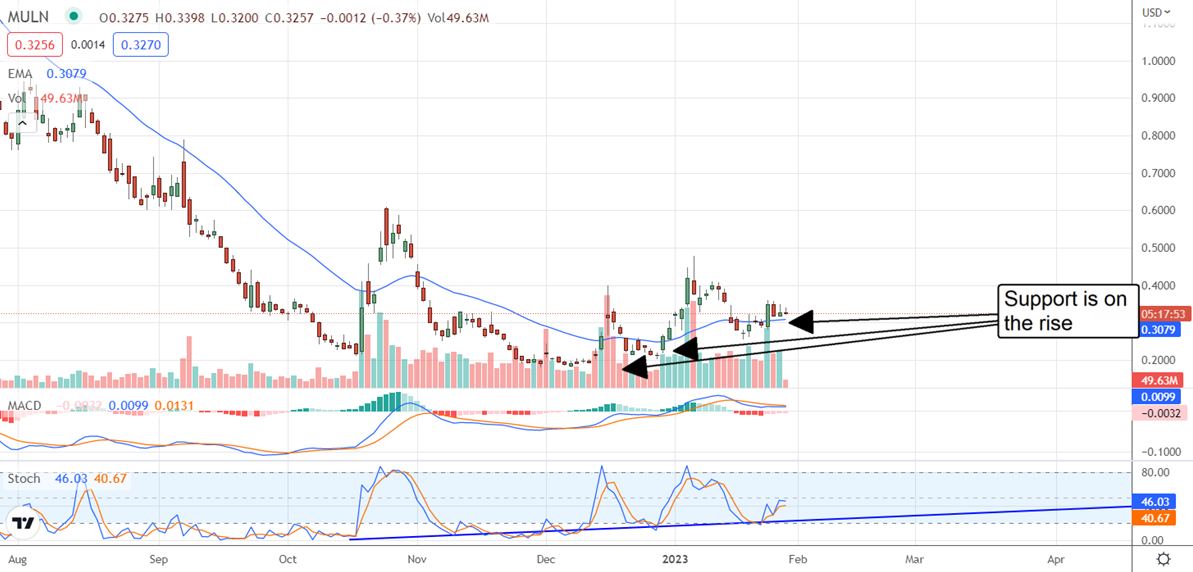- Mullen Automotive announced 11 new hires across teams and segments.
- 4 new members help flesh out the growing commercial and consumer sales divisions.
- The 1st institutional buying in over a month has been logged.
Mullen Automotive (NASDAQ:MULN) recently announced the hiring of 11 more executives for its growing fleet. The hires include new team members for the commercial van and truck segment and the flagship FIVE crossover segment and span all areas of operations. These hires follow John Schwegman and Ronald Dixon, who are both former GM executives with world-class experience. Mr. Schwegman was brought on board to lead the commercial sales team, while Mr. Dixon leads sales to government fleets.
Seven new hires are in product development, 4 in sales, service, and parts, including Matt Gostek as Director of Service and Parts. This means the company is gearing up for the launch of its fleet, which has been indicated for the end of the quarter. Ultimately, what it means is a significant catalyst for the stock price, but there are still hurdles to overcome.
The results of the shareholder meeting should help get the company past those hurdles but not without some volatility for share prices. Increasing the share count to 5 billion from 1.7 will provide an avenue to capital the company needs but also downward pressure on stock prices, shareholder dilution, and an opportunity for the bears.
The bears are still selling this stock, but they appear to have slacked off a bit in the last week. The short interest is down slightly and allowing the price action to advance, but this may be setting up the next selloff which could be triggered by signs the company is selling shares as well.
Mullen Gets Ready To Produce Cars; Another Institution Takes A Nibble
Mullen Automotive announced a game-changing order from Randy Marion Group in Q4 of 2022. This deal, for 6,000 vehicles, came with the expectation deliveries would begin by the end of Q1 2023. As it is, the company appears to be on track to begin producing, but there is no word on when it will begin or if it will be able to meet the deadline.
“This is a real vote of confidence in our company. We appreciate Randy’s vision and aggressiveness to partner with us,” said John Schwegman, chief commercial officer for Mullen Automotive. “He clearly sees the future in commercial EVs.”
Institutional activity may be about to heat up, but it really depends on the production timeline. The 1st institutional purchase since BNY Mellon (NYSE:BK) dropped $0.47 million into the market has been posted on Marketbeat’s institutional activity tracking pages. That support can be seen in the chart.
The new purchase is by Private Advisor Group LLC, which is a platform linking private financial advisors with clients. It purchased 305,541 shares for $87,000 and increased its stake by 15%. It is not the largest shareholder by far; that’s BlackRock (NYSE:BLK) with 5% and Vanguard with slightly less.
Takeover Speculation Helps Lift EV Market
Rumors that Lucid Diagnostics (NASDAQ:LUCD) would get taken private hit the market last week and helped lift stocks. The news centered around Saudi Arabia’s Public Investment Fund, which already holds a large stake in the company. The takeaway from the analysts' chatter is that a takeover should not be unexpected, and may not come from Saudi Arabia.
What this means for Mullen and other EV start-ups is as yet unclear but opens the door to potential takeovers. Any OEM looking to advance its EV project could be interested in a startup already producing cars.
The Technical Outlook: Mullen Automotive Is Shifting Gears
As bearish as the bears are, the market for Mullen Automotive looks more bullish by the day. The market has put to a bottom and has rising support confirmed by the indicators. The market looks like a coiled spring ready to unwind; the question is which direction will it go?
Assuming the news that comes out is good, this market should spring higher. The first target for resistance is at the $0.40 level but it looks like this market could easily get over the level given the right catalyst.
The bad news is that company sales of stock could cap gains for the foreseeable future, and that is compounded by the potential for short-selling.

